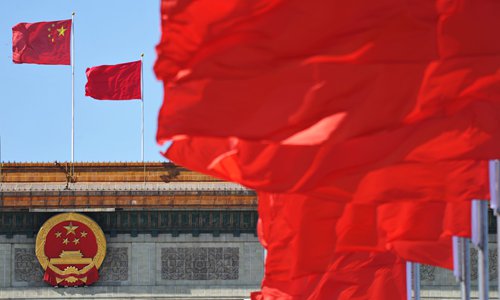
Photo: IC
China's October 1 celebration of the 70th anniversary of the founding of the People's Republic of China (PRC) marks an international historic achievement. The liberation of China 70 years ago is a key event in the rejuvenation of the Chinese nation with enduring global significance.
After a century and a half of exploitation by Western imperialism, the Communist Party of China undertook a monumental national liberation struggle. The epic Long March symbolizes today the courage, fortitude, and heroism of those committed to the creation of the PRC based on the interests of the Chinese people.
The significance of China's National Day takes on multiple meanings. It symbolizes the success of China's 20th century national liberation struggle to be sure, but it more broadly symbolizes the rejuvenation of a 5,000-year-old civilization as well as modernization.
Visiting Beijing's Palace Museum and National Museum leaves a vivid sense of the span of Chinese history and its achievements. Walking out of the museums into the bustling modern capital city with its modern urban architecture and high tech offers not only a contrast, but also a sense of continuity with past accomplishments in architecture, technology and civilization.
China's domestic and foreign policy pursues peace and development. These objectives are being realized year after year and the international community respects China's record of achievements and looks forward to further Chinese contributions to these ends.
Former US president Jimmy Carter pointed out to President Donald Trump in June that China has not been engaged in constant foreign wars. Carter meant to signal to Trump that the US has squandered its wealth on unnecessary wars rather than on using it productively for national development.
The condition of a country is indeed a reflection of the use of its wealth. For China, it has been invested in peace and development while for the US it has been recklessly wasted on endless unnecessary foreign wars.
Former Chinese leader Deng Xiaoping's far-sighted policy of reform and opening-up has shown remarkable results in recent decades. His emphasis on advancing science and technology, as well as unleashing the productive forces in the economy, moved China forward into an advanced state in many sectors.
President Xi Jinping as a core leader is guiding China into its next phase of national development.
Economic advancement permits China to wield a strong defensive military force and at the same time progressively raise the standard of living for its people. Chinese leaders while recognizing the wisdom of the reform and opening-up process have not forgotten the poor. Poverty reduction in China has been a remarkable achievement and continues to be a focal point for innovation and needed initiatives.
Sometimes overlooked is China's significant commitment to the environment. Of course, a viewer looking at an ancient Daoist landscape painting certainly gets the message that Chinese culture has a traditional respect for nature. But this ancient sensibility has become a core value in today's economic planning and development in China.
Immense reforestation projects, water projects, pollution control initiatives and environmentally informed large-scale projects demonstrate the commitment of China to an ecological civilization today in line with core cultural values.
The US and China have had almost continuous relations since the 18th century. A rough spot developed after World War II but this was overcome by the initiative of US president Richard Nixon in 1972 and later by president Carter.
Unfortunately, a bipartisan hawkish consensus against China emerged in the US over the past decade. Rather than recognizing opportunity for a new type of major power relations as China's President Xi suggested in 2013, Washington has turned a deaf ear.
The 70th anniversary celebrations in China will cause reflection on China's stunning success as well as on the path ahead. It is to be hoped that it will cause reflection in Washington and lead to the adoption of a constructive policy toward China.
The author is an educator and former senior professional staff member of the Senate Committee on Foreign Relations. opinion@globaltimes.com.cn


